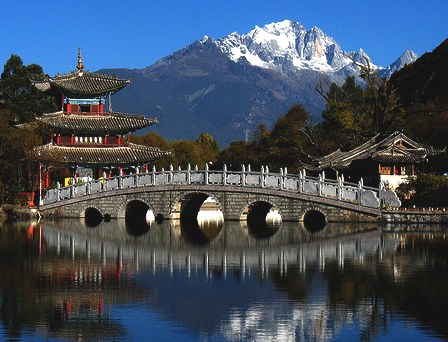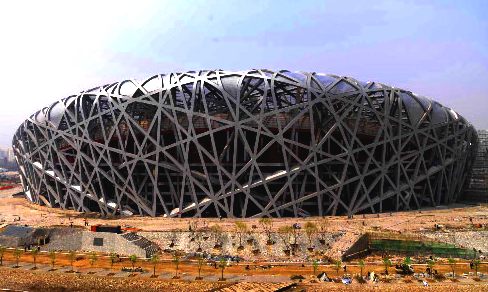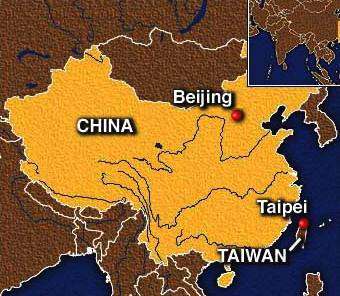|
|
|||||||
|
HOME | BIOLOGY | BOOKS | FILMS | GEOGRAPHY | HISTORY | INDEX | INVESTORS | MUSIC | NEWS | SOLAR BOATS | SPORT |
|||||||
|
Beijing (Chinese: 北京; Pinyin: Běijīng, a city in northern China, is the capital of the People's Republic of China (PRC). It was formerly known in English as Peking or Peiking. Beijing is also one of the four municipalities of the PRC, which are equivalent to provinces in China's administrative structure. Beijing Municipality borders Hebei Province to the north, west, south, and for a small section in the east, and Tianjin Municipality to the southeast.
Beijing is China's second largest city in terms of population, after Shanghai. It is a major transportation hub, with dozens of railways, roads and expressways entering and leaving it in all directions. It is also the focal point of many international flights to China. Beijing is recognized as the political, educational, and cultural center of the People's Republic of China, while Shanghai and Hong Kong predominate in economic fields. However, Beijing is increasingly proving itself to be an entrepreneurial hub, and a center for growing ventures with a culture of innovation in China.
Beijing is one of the Four Great Ancient Capitals of China. It will also host the 2008 Summer Olympics.
Welcome to China
Geography and climate
Beijing is situated at the northern tip of the roughly triangular North China Plain which opens to the south and east of the city. Mountains to the north, northwest and west shield the city and northern China's agricultural heartland from the encroaching desert steppes. The northwestern part of the municipality, especially Yanqing County and Huairou District, are dominated by the Jundu Mountains, while the western part of the municipality is framed by the Xishan Mountains. The Great Wall of China, which stretches across the northern part of Beijing Municipality, made use of this rugged topography to defend against nomadic incursions from the steppes. Mount Dongling in the Xishan ranges and on the border with Hebei is the municipality's highest point, with an altitude of 2303 m. Major rivers flowing through the municipality include the Yongding River and the Chaobai River, part of the Hai River system, and flowing in a southerly direction. Beijing is also the northern terminus of the Grand Canal of China which was built across the North China Plain to Hangzhou. Miyun Reservoir, built on the upper reaches of the Chaobai River, is Beijing's largest reservoir, and crucial to its water supply.
The urban area of Beijing, located at (39.9056, 116.3914), is situated in the south-central part of the municipality and occupies a small but expanding part of the municipality's area. It spreads out in bands of concentric ring roads, of which the fifth and outermost (the Sixth Ring Road; the numbering starts at 2) passes through several satellite towns. Tian'anmen (Gate of Heavenly Peace) and Tian'anmen Square are at the centre of Beijing, and are directly to the south of the Forbidden City, former residence of the emperors of China. To the west of Tian'anmen is Zhongnanhai, current residence of the paramount leaders of the People's Republic of China. Running through central Beijing from east to west is Chang'an Avenue, one of Beijing's main thoroughfares.
The city's climate is harsh, characterized by hot, humid summers due to the East Asian monsoon, and cold, windy, dry winters that reflect the influence of the vast Siberian anticyclone. Average temperatures in January are at around -7 to -4 °C, while average temperatures in July are at 25 to 26 °C. Annual precipitation is over 600 mm, with 75% of that in summer. [3]
Beijing also suffers from heavy pollution and poor air quality from industry and traffic. Dust from erosion of deserts in northern and northwestern China result in seasonal dust storms that plague the city. In the first four months of 2006 alone, there were no fewer than eight such storms. [4] Efforts have been made of late to clean up Beijing in preparation for the 2008 Summer Olympics.
China - Travel guide
LINKS and REFERENCE
Culture & Lifestyle
Travel and tourism
Images of Beijing
DOOMSDAY OPERATION GRAND SLAM - Disillusioned extremists in Iran, North Korea and Russia, have grown impatient waiting for their leaders to act decisively, having watched the Ukraine debacle of Vladimir Putin rebound to weaken their CRINK axis members. This despite Hamas launching against Israel and Houthi attacks on the Red Sea. All that had the effect of waking the sleeping giant: NATO.
They
hatch a plot to kidnap top politicians from the west to create
confusion, as a prelude to an all out cyber
nuclear first and second strike, having first stockpiled sufficient gold
and weapons reserves, and fallout bunkers for their cells, to be able to
stage a second wave of conventional attacks, to in effect, take over the
world after the nuclear holocaust they
have engineered. Including assassinating their jaded leaders: Xi
Jinping; Vladimir
Putin, Iranian Grand Ayatollah, Ali
Khamenei, and Kim
Jong Un, supreme leader of communist North
Korea.
A - Z SPORTS INDEX
Solar Cola drinkers care about planet earth
.. Thirst for Life
(330ml Planet Earth can)
|
|||||||
|
This website is Copyright © 1999 & 2024 Max Energy Limited, an environmental educational charity working hard for world peace. The names Solar Navigator™,Blueplanet Ecostar BE3™ and Utopia Tristar™ are trademarks. All other trademarks are hereby acknowledged.
|





